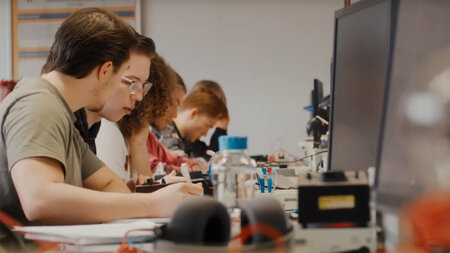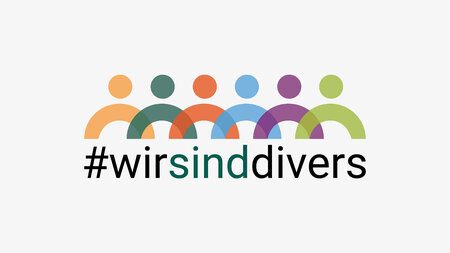Overview

Welcome to the new Master's program Design and Test for Integrated Circuits!
The program provides a future-oriented education in the fields of designing, manufacturing and testing of integrated circuits. The initial theory courses are the base for the more practical oriented modules later. All courses are held by researchers actively working in the field enabling best up-to-date skills for the professional career of the graduates.
“The Master’s degree program Design and Test for Integrated Circuits combines Design, Technology, Reliability and Test in a unique way to gain knowledge and practical experience for chip production. Multiple industry research partners are involved in the program enabling access to the latest developments in this field.” – Prof. Dr. Ulrich Heinkel, Chair of Circuit and System Design, Chemnitz University of Technology
The application portal in Uniassist opens at the beginning of May 2024.
Career opportunities
The possibilities for the graduates are excellent. They may work in IC design houses, fabs, semiconductor test companies and device characterization departments. The English course language enables you to work world-wide, f. e. in the following areas:
- Semiconductor industry
- Chip and sensor industry
- Automotive, aviation and railway industry
- Research and development at universities
- Employment at state-owned and private research facilities
Course structure
The Master's program includes in its basic modules advanced foundational knowledge in the areas of reliability, technology, and the design and testing of integrated circuits. In-depth modules offer the opportunity for further specialization. These courses are aligned with the latest research of the respective professors, reflecting the current international state of work. From the catalog of practical oriented modules, at least one module must be selected to ensure the practical relevance of the education. For students with a particularly high scientific interest, the Research Project module provides an insight into practical university research.
Basic Modules (1st – 2nd semester)
- Design of Digital Systems
- Design of Heterogeneous Systems
- Test of Digital and Mixed- Signal Circuits
- Elements of Integrated Circuits
- Technologies for Micro and Nano Systems
- Integrated Circuit Design - Transistor Level
- Reliability of Micro and Nano Systems
Practical Oriented Modules (2nd – 3rd semester)
- Research Internship
- Research Project
- Applied Circuit Design and Testing
- Layout of ICs and PCBs
Focal Modules (1st – 3rd semester)
- Modern microscopies
- Verification of Digital Systems
- Numerical Methods for Materials and Reliability of Micro and Nano Systems
- Failure Analytical Methods for Micro and Nano Systems
- Smart Sensor Systems
- Semiconductor Physics - Nano Structures
- Advanced Integrated Circuit Technologies
- Microsystems Design
- Micro and Nano Devices
- Flexible Electronics
- Digital Components and Architectures for Data Processing
- Multisensorial Systems
- Digital Signal Processing 1
- Programming and Data Analysis
- Optimization in Applications
- Advanced Methods for Integrated Circuits
Module Master Thesis (4th semester)
Admission requirements for international students
| Academic: |
in general vocationally-qualifying university bachelor’s degree in Electrical Engineering, Information & Communication Technology or equivalent degree program with regard to content |
| English: |
B2 or equivalent proof of English language proficiency |
| German: |
A1 for regular admission and enrolment. A2 until the end of the 3rd semester |
| Degree: |
Master of Science (M.Sc.) |
| Start of course: |
October (winter-semester) |
| Application deadline: |
15th July (international students, Uni Assist) |
| Duration of study: |
4 semesters (2 years) |
| Total Credits: |
120 ECTS Points |
| Location: |
Chemnitz, Germany |
|
The medium of instruction is English. The additional requirement for German language proficiency is caused by general regularities of the university. |
|
Application
| Application procedure for international students | International students have to apply though Uni Assist according to the instructions given by the related sites of uni-assist. |
| Application procedure for German students | German students are asked to use the university's online application portal and follow the instructions given by Studentenservice. |
| Central Course Guidance Service | Studierendenservice |
| Academic counseling | 
Dr. Jürgen Bräuer
Academic Advisor
|
Contact

-
Telefon:+49 371 531-35093
-
E-Mail:
-
Adresse:Reichenhainer Straße 70, 09126 Chemnitz
-
Raum:C25.114 (alt: 2/W114)
FAQ
-
Do I need to have German language skill to take part in this course?
Though the mode of teaching is in English for this course. German Level A1 Certificate is required for regular admission and enrolment and German Level A2 Certificate should be submitted by the end of 3rd semester.
-
Where can I find important dates during the semester for this program?
Details about important dates for the semester cyle can be found at this link.
-
Who can be the supervisor of the master thesis?
Advisor of the master thesis can be any professor from the department of Electrical Engineering and Information Technology (link to the professorships), but the professorship should be related to the topic of the thesis.
-
What is the optimal duration of the studies?
The optimal duration of the studies is four semesters. It is important to maintain it, because it is not well accepted by research and industry to extend the study duration.
-
Is the master course research or industry oriented?
The master course includes fundamental and applied knowledge. The graduates have possibilities to make a career both in research as well as in industry. For both, they need to fulfill the corresponding course requirements. For a research career, the results obtained during the studies should be significantly higher than the average generally reached.
-
What is the optimal date to come to Chemnitz?
The studies begin in October every year. The first week is dedicated to introduction to studies: "Orientation-Phase" which includes:
- Interesting information about study requirements, study environment, location of important offices, Buildings and library.
- Enrolment to the practicals is also carried out during the first week of the semester.
- During second week of the course professor from each chair introduces the topics, outlines and expectations of the specific courses.






